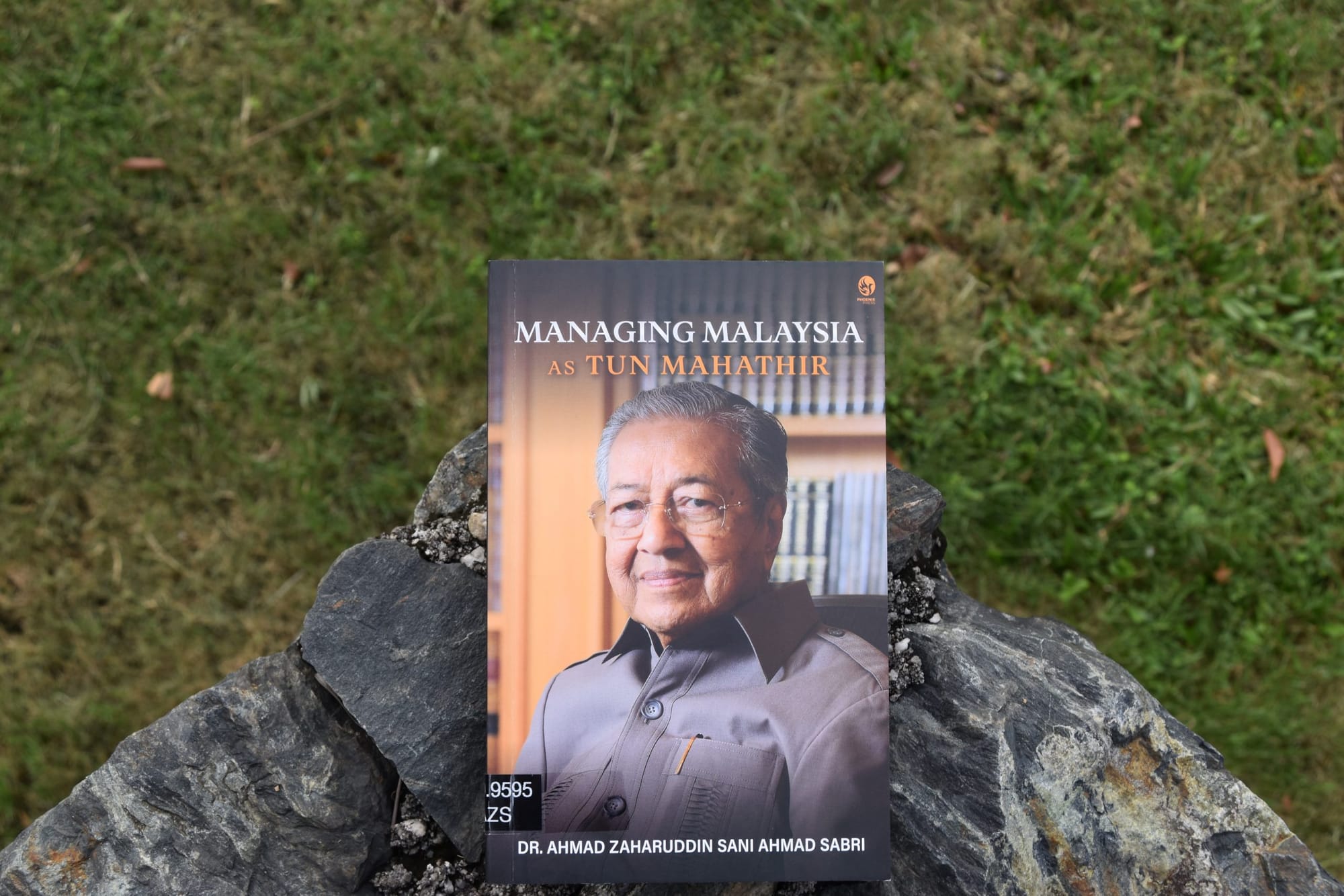Mahathir’s Strategic Leadership: Prescriptions for National Governance
Dr. Mahathir’s medical background shaped his leadership, enabling him to approach governance with precision, strategic foresight, and pragmatic solutions.

In my book, Managing Malaysia as Dr. Mahathir, I delve into the distinctive decision-making approach of Dr. Mahathir Mohamad, whose background as a trained medical doctor profoundly influenced his governance. Serving as Prime Minister for 22 years plus 22 months years across two terms, Mahathir stands out as one of the most prominent figures in Malaysian history. His tenure transformed the country’s socio-economic landscape and showcased his remarkable ability to diagnose complex issues and implement pragmatic solutions.
Mahathir's leadership style was characterized by meticulous planning and strategic foresight, reminiscent of a physician diagnosing and treating intricate ailments. This unique blend of clinical knowledge and political acumen established a distinctive governance framework that has left an enduring impact on Malaysia’s political landscape. Through ambitious projects and innovative policies, Mahathir shaped Malaysia’s trajectory, making his approach to decision-making a compelling subject of analysis.
The Doctor in Politics: A Unique Perspective
Having graduated from King Edward VII College of Medicine in Singapore in 1953, Mahathir’s medical training influenced his leadership style significantly. As a doctor, he was trained to analyze symptoms, identify underlying causes, and prescribe appropriate treatments. This methodical and analytical mindset became evident during his time in office, particularly when approaching national issues.
For Mahathir, the nation was akin to a patient needing careful diagnosis and treatment. He meticulously assessed Malaysia’s socio-economic conditions, identifying poverty, inequality, and underdevelopment as symptoms of deeper systemic issues. His prescription for these ailments was a series of policies aimed at restructuring the economy, promoting education, and fostering unity among Malaysia’s diverse ethnic groups.
Read More WF News

Implementing Policy with Precision
Mahathir’s first term in office (1981-1999) brought about ambitious initiatives that had long-term ramifications for Malaysia. One of his most significant policies was the New Economic Policy (NEP), which addressed the economic disparities between different ethnic groups. The NEP provided affirmative action for the bumiputera (Indigenous Malays) to uplift their socio-economic status.
In his decision-making process, Mahathir employed a methodical approach typical of his medical training. He gathered comprehensive data and evidence to support his policies. The NEP was not just a reflex action; it was a carefully calculated decision based on the socio-economic realities of Malaysia. Mahathir understood that addressing inequality was essential to national unity and stability, much like treating a chronic condition requires addressing its root causes.
The Surgical Precision of the Punch Card Policy
One of the more innovative and controversial methods introduced during Mahathir's leadership was the "punch card" system for public healthcare and civil service appointments. Drawing from his medical background, Mahathir understood the need for efficiency and accountability in governance.
The punch card system was introduced to ensure that civil servants adhered to their working hours and provide a clear mechanism for tracking attendance. To Mahathir, governance required more than good intentions; it necessitated systems and structures that could optimize human resources and efficiency. By implementing the punch card system, he aimed to instill a sense of discipline within the government workforce, similar to the ethical standards expected in the medical profession.
The punch card policy, while seemingly simplistic, was a reflection of Mahathir’s commitment to fostering a culture of accountability in public service. He believed that a government should function as efficiently as a well-run hospital—where every individual plays a crucial role in delivering quality services. The introduction of this system served to reduce absenteeism and ensure that civil servants were present and engaged in their duties.
Moreover, the punch card policy resonated with his vision of a Malaysia that was technologically advanced and efficient. It coincided with the broader goal of modernizing the civil service, ensuring that it could meet the demands of a rapidly changing economy. By leveraging technology in public administration, Mahathir sought to create a government that was responsive, accountable, and trusted by the people.
Resilience in Crisis: Lessons from His Medical Training
Throughout his leadership, Dr. Mahathir faced numerous crises—financial, political, and social. He navigated these challenges with a resilience that echoed his medical training. When Malaysia faced the 1997 Asian Financial Crisis, Mahathir's decision-making was a testament to his ability to remain calm under pressure. Rather than resorting to traditional measures like seeking aid from the International Monetary Fund (IMF), he took a more unconventional stance, implementing capital controls and defending the ringgit.
Mahathir's medical background equipped him with the ability to analyze situations critically and implement solutions rapidly. Just as a doctor must act in the best interest of a patient under urgent circumstances, he made bold decisions that were often met with skepticism yet ultimately proved successful in stabilizing the economy. His approach during this crisis showcased a blend of calculated risk-taking and profound understanding of economic principles, reinforcing his reputation as a pragmatic leader.
A Legacy of Critical Thinking and Adaptability
Dr. Mahathir’s legacy lies not just in the policies he implemented but in his approach to decision-making and governance. By drawing parallels between his medical training and political leadership, the key elements of critical thinking, community consultation, and a results-oriented mindset stand out as hallmarks of his administration.
In a nation as diverse as Malaysia, where ethnicities, cultures, and beliefs intertwine, Mahathir’s methodical approach helped navigate potential pitfalls. His decisions were underscored by an understanding that effective governance requires not just action but thoughtful examination and consideration of the implications that policies hold for various societal segments.
The challenges that Malaysia faces during that day (perhaps till today)—economic inequality, social division, and global competition—require a nuanced understanding of governance. Dr. Mahathir’s approach serves as a guiding framework for future leaders. In an era of digital transformation and rapid change, the principles he embodied remain relevant; analysing situations critically, implementing innovative policies, and practising responsible leadership are essential for navigating the complexities of governance.
The Doctor's Legacy in Leadership
Dr. Mahathir Mohamad’s combination of medical training and political vision offers a unique lens through which to view governance. His decision-making processes emphasized evidence-based policies, accountability, and the need for structured systems—principles that have left an indelible mark on Malaysia.
As the nation continues to evolve, Mahathir's legacy challenges future leaders to adopt a similar balance of critical thinking, ethical governance, and empathetic leadership. Like a doctor diagnosing and treating ailments, effective leadership requires understanding the nuances of the human condition and tailoring actions to meet the diverse needs of the populace.
In a world fraught with uncertainty, Dr. Mahathir’s journey from the clinic to the Cabinet serves as a powerful reminder that informed decision-making, rooted in compassion and accountability, is the best medicine for society's ills. Ultimately, his holistic approach to governance invites a future where leadership not only addresses immediate concerns but also fosters a healthier, more equitable society for generations to come.
While I am not a big fan of Dr. Mahathir, I believe it’s crucial to acknowledge his substantial contributions to Malaysia’s development. My observations, shaped by my experiences working with him, reveal a leader whose unique decision-making approach was heavily influenced by his medical background. His meticulous planning and strategic foresight allowed him to diagnose and address Malaysia's complex issues effectively. Notable achievements during his tenure, including ambitious infrastructure projects and economic reforms, have undeniably shaped the nation’s socio-economic landscape. Although his leadership style was often polarizing, his ability to implement pragmatic solutions has left an enduring legacy that continues to influence Malaysia today.

